In the Heat of the Night 4K Blu-ray Movie
HomeIn the Heat of the Night 4K Blu-ray Movie 
Includes They Call Me MISTER Tibbs! and The Organization on standard BD / 4K Ultra HD + Blu-rayKino Lorber | 1967 | 3 Movies | 110 min | Not rated | Apr 19, 2022
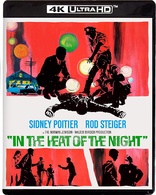
Movie rating
8.2 | / 10 |
Blu-ray rating
| Users | 4.2 | |
| Reviewer | 5.0 | |
| Overall | 4.2 |
Overview
In the Heat of the Night 4K (1967)
An African American police detective is asked to investigate a murder in a racially hostile southern town.
| Drama | 100% |
| Film-Noir | 31% |
| Crime | 29% |
| Mystery | 16% |
| Thriller | 6% |
Specifications
Video
Video codec: HEVC / H.265
Video resolution: 4K (2160p)
Aspect ratio: 1.85:1
Original aspect ratio: 1.85:1
Audio
English: DTS-HD Master Audio 2.0 Mono (48kHz, 24-bit)
English: DTS-HD Master Audio 5.1 (48kHz, 24-bit)
Subtitles
English
Discs
Blu-ray Disc
Two-disc set (2 BDs)
4K Ultra HD
Packaging
Slipcover in original pressing
Playback
Region A (locked)
Review
Rating summary
| Movie | 4.0 | |
| Video | 5.0 | |
| Audio | 5.0 | |
| Extras | 5.0 | |
| Overall | 5.0 |
In the Heat of the Night 4K Blu-ray Movie Review
Reviewed by Dr. Svet Atanasov April 22, 2022Norman Jewison's "In the Heat of the Night" (1967) arrives on 4K Blu-ray courtesy of Kino Lorber. The supplemental features on the disc include archival audio commentary by Norman Jewison, cinematographer Haskell Wexler, and actors Rod Steiger and Lee Grant; archival program with Quincy Jones; promotional trailers; and more. In English, with optional English SDH subtitles for the main feature. Region-Free.
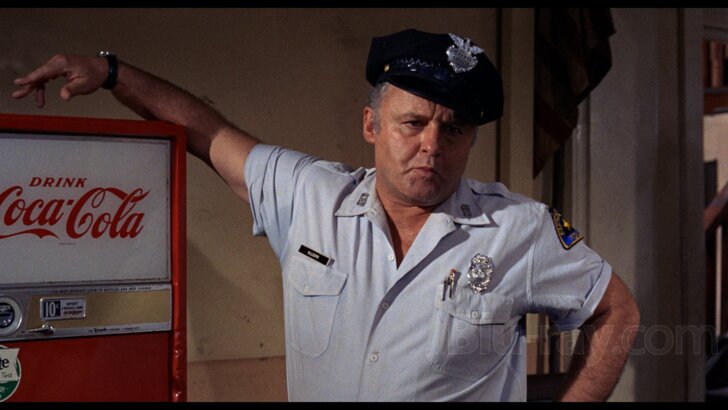
What happens if a group of people spend their lives isolated in a bubble where all they hear is the echo of their own prejudiced voices? They gradually become convinced that the bubble is a replica of the real world that they are a part of, and eventually the bubble’s rules and logic become their credo. The size of this place rarely matters, what does is how strong it is. The more difficult it is to crack it, the more delusional and dangerous its inhabitants usually are.
Norman Jewison’s film In the Heat of the Night is set in the early ‘60s and it is about one such bubble that has found a cozy place to exist somewhere in the heart of Mississippi. It is so small that in it everybody knows everybody by name, and though often some of its inhabitants don’t see each other for months, at any moment they know exactly where to look for their neighbors -- the blacks are on that side, while the whites are on the exact opposite side. It is a simple map to remember, practical too.
But the seemingly perfect bubble is seriously shaken up when on a hot summer night the cold body of a wealthy businessman who has been preparing to open a plant that will provide employment for a large number of people is discovered by a lonely policeman (Warren Oates), and shortly after a ‘colored man’ (Sidney Poitier) from out of town is picked up at the local train station. Police Chief Gillespie (Rod Steiger) quickly goes to work to solve the murder mystery, and then just as quickly concludes that he has all he needs to officially declare that the killer is the man that has been brought to him. However, Gillespie’s theory instantly falls apart when the ‘killer’ pulls out a police badge and then his superior from up North confirms to him that he is in fact one of his best murder investigators. Gillespie then reluctantly begins reevaluating the murder case, and eventually just as reluctantly agrees to use the investigator to help him solve it. Inside the bubble, however, very few people like the idea, and the closer the two men get to the real killer, the more vocal their objections become.
This award-wining film is based on the popular novel by John Ball and exactly like it uses the murder case as a ruse to scorch a bunch of bigots. It plows right through the ugly that defines them and at the end leaves them to drown in their numerous prejudices and hypocrisy. All of this is extremely easy to see and understand.
However, much like Robert Altman’s The Player -- which is another very good film that uses a murder case to expose a much larger and more diverse group of bigots and hypocrites but in a slightly more delicate manner -- the film also mixes the ugly with a decent dose of humor that can make parts of it look quite surreal, and that is where its Achilles’ heel is because it was meant to look legit. For example, even though Steiger won an Oscar for his performance, the mannerisms of his character are so exaggerated that he frequently emerges as a parody figure that was borrowed from an entirely different film. (The macho attitude and especially the awful mumbling with the chewing gum in the segment where the cold body of the businessman is examined, for instance, are so over the top and out of sync that it is flat-out odd that edits were not made). Quite predictably, when much later on the film attempts to make the crucial point that Steiger and Poitier’s characters are more or less the same because they are loners using their work to hide their frustration, and that they are both left with no other choice but to pretend that the racism around them is just another normal fact of life, the comparison looks incredibly suspicious.
Thankfully, some of the supporting actors manage to look a lot more authentic. Oates, who was born and raised in Kentucky, pretty much nails that classic Southern laid-back attitude, though when Steiger starts confronting him he too begins exaggerating some of the immediate reactions of his deputy.
The soundtrack that Quincy Jones created is very interesting. Instead of simply enhancing the existing atmosphere, the music actually tries to do all sorts of neat things to produce contrasts that bring in new energy. During the late ‘60s and early ‘70s, in Europe plenty of composers did something very similar when they scored various genre films. (Listen to Ennio Morricone’s soundtrack for Investigation of a Citizen Above Suspicion, and Bruno Madena’s soundtrack for Death Laid an Egg). A very fine recording of Ray Charles singing In the Heat of the Night is also heard in the film.
In the Heat of the Night 4K Blu-ray Movie, Video Quality 
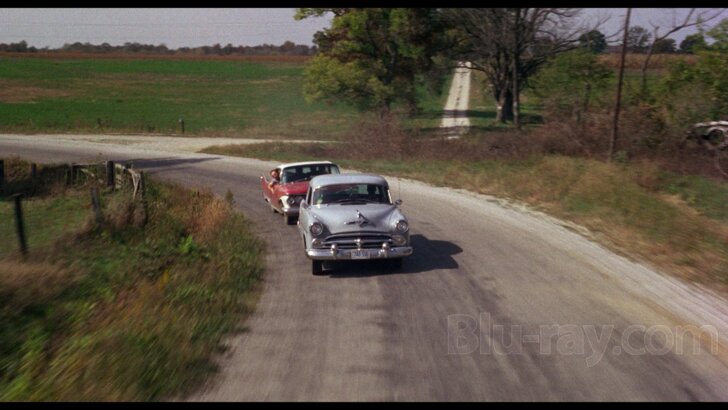
Kino Lorber's release is a 4K Blu-ray/Blu-ray combo pack. However, In the Heat of the Night is offered only in native 4K on the 4K Blu-ray disc. There is no Blu-ray copy with a presentation the film in 1080p.
The release offers a native 4K presentation of the 4K restoration of In the Heat of the Night that was initially introduced by the Criterion Collection with this Blu-ray release. I think that this is a magnificent restoration that essentially makes the film look brand new. It has exceptionally strong organic qualities as well.
So, the 4K presentation does not come with a Dolby Vision/HDR grade, but I think that the film looks absolutely stunning in native 4K. A lot of the darker footage, in particular, boasts excellent ranges of nuances that look great on a bigger screen. Also, there are various density fluctuations that are handled better in 4K as well. How much better? The higher resolution makes these shifts appear more natural, so if you pay attention to such details, you will notice the difference. Depth is excellent, but I did not think that there was a significant improvement. On the contrary, while switching between the 4K and 1080p content, I thought that pretty much all of the 1080p content still looked absolutely magnificent. Density levels appear superior in 4K. I can't tell you exactly by how much because different segments have different native qualities, but I noticed a difference during wider panoramic shots and close-ups. (You can see examples of content with varying density levels where delineation fluctuates as well in screencaptures #1 and #7). My guess is that the bigger your screen is, the easier it will be for you to appreciate the difference. If you project, the improvement will be even more substantial. Fluidity is outstanding, but this isn't an upgrade because it was just as pleasing in 1080p. There are no stability issues. The entire film looks spotless as well. (Note: This is a Region-Free release).
In the Heat of the Night 4K Blu-ray Movie, Audio Quality 
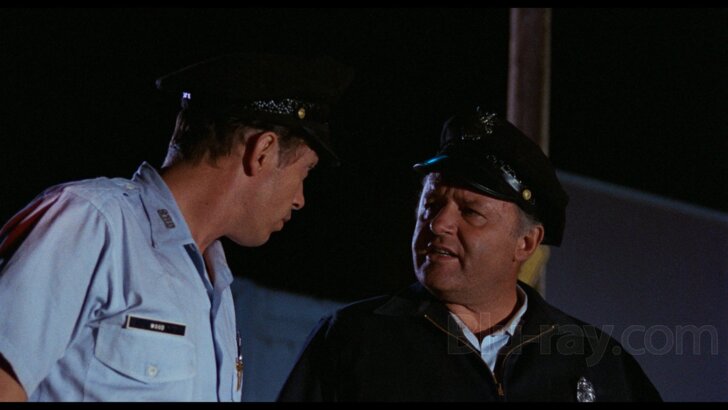
There are two standard audio tracks on this release: English DTS-HD Master Audio 2.0 and English DTS-HD Master Audio 5.1. Optional English SDH subtitles are provided for the main feature.
I viewed the film with the 5.1 track because it was not available on the Criterion Blu-ray release. I think that it is very good. Some of the action footage definitely benefits and it feels like the audio filed is just wider. In terms of dynamic nuances I think that there isn't a huge discrepancy between the 5.1 and 2.0 tracks, but I wasn't trying to spot particular areas where such may exist either. The dialog was clear, sharp, and stable.
In the Heat of the Night 4K Blu-ray Movie, Special Features and Extras 
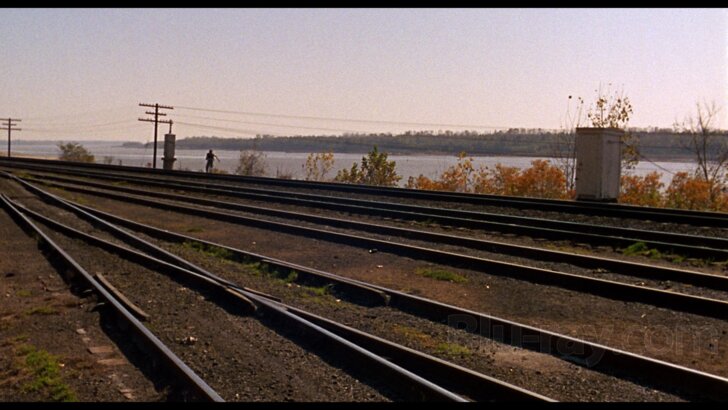
4K BLU-RAY DISC
- Commentary One - this archival audio commentary features Norman Jewison, cinematographer Haskell Wexler, and actors Rod Steiger and Lee Grant. It was recorded in 2008, and has already appeared on other home video releases of In the Heat of the Night.
- Commentary Two - this exclusive new audio commentary was recorded by critics Steve Mitchell and Nathaniel Thompson with Robert Mirisch (Nephew of Walter Mirisch, and Son of the Mirisch Company Founder Harold Mirisch).
- They Call Me Mister Tibbs! (1970) - presented here the sequel to In the Heat of the Night. Back in San Francisco, a high-priced call girl is murdered and Lieutenant Virgil Tibbs (Sidney Poitier) is on the case. Co-Starring Martin Landau and Barbara McNair, and directed by Gordon Douglas. In English, with optional English SDH subtitles. (109 min./1080p).
- The Organization (1971) - lieutenant Virgil Tibbs (Sidney Poitier) helps a group of idealistic vigilantes expose a drug ring controlled by powerful businessmen. Co-Starring Barbara McNair and Gerald S. O'Loughlin, and directed by Don Medford. In English, with optional English SDH subtitles. (108 min./1080p).
- Turning Up the Heat: Movie Making in the '60s - this archival program takes a closer at the production history of In the Heat of the Night. Included in it are clips from interviews with director Norman Jewison, producer Walter Mirisch, filmmakers John Singleton and Reginald Hudlin, and film historian Patricia King Hanson, amongst others. The program was produced in 2008. In English, not subtitled.(22 min).
- The Slap Heard Around the World - this archival program takes a closer look at a key scene in In the Heat of the Night. In English, not subtitled. (8 min).
- Quincy Jones: Breaking New Sound - this archival featurette focuses on Quincy Jones' career and the unique soundtrack that he created for In the Heat of the Night. Included in it are clips from interviews with the Grammy-winning composer, jazz legend Herbie Hancock, and film music historian Jon Burlingame, amongst others. The program was produced in 2008. In English, not subtitled. (13 min).
- Trailers -
1. In the Heat of the Night
2. They Call Me Mister Tibbs!
3. The Organization
In the Heat of the Night 4K Blu-ray Movie, Overall Score and Recommendation 
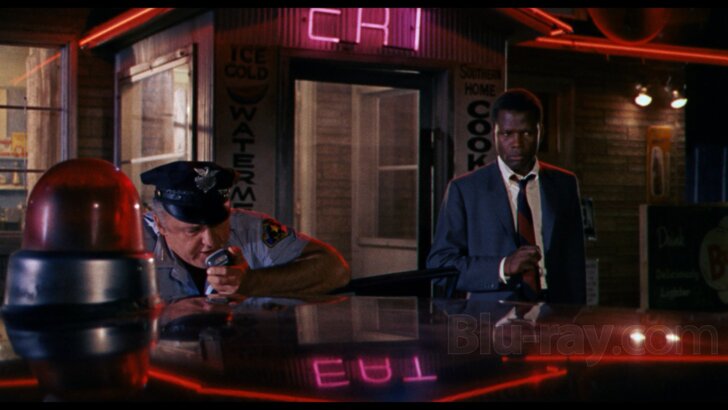
Some years ago there were enough creative people in Hollywood who had a genuine connection with real America that allowed them to understand the experiences of ordinary Americans, and some recreated them in their films. In the Heat of the Night is a product of this understanding. In case you are wondering, this is not my opinion. It is an opinion shared in the archival audio commentary included on this release, and I just happen to wholeheartedly agree with it. Contemporary Hollywood is different. I think that it is even worse than the elitist community Robert Altman depicted in The Player, and the crucial connection between its stars and ordinary Americans that existed in the old days may very well be permanently lost. It is one of the key reasons why in recent years there has been so much public animosity between the two sides. In the Heat of the Night tells a story about a murder case, but it is really about prejudice, the ugliest type of bigotry, and ultimately the refusal to accept that the 'other side' has the right to be... well, right. Think about this. Kino Lorber's 4K Blu-ray release offers a great native presentation of the excellent recent 4K restoration of In the Heat of the Night, which was initially introduced on Blu-ray by the Criterion Collection. Also included on it as bonus features are Gordon Douglas' They Call Me Mister Tibbs! and Don Medford's The Organization. HIGHLY RECOMMENDED.
Other editions
In the Heat of the Night: Other Editions

In the Heat of the Night
1967

In the Heat of the Night
Awards O-Ring Slipcover
1967

In the Heat of the Night
1967

In the Heat of the Night 4K
1967

In the Heat of the Night 4K
1967
Similar titles
Similar titles you might also like

The Crimson Kimono
Limited Edition to 3000
1959

Devil in a Blue Dress 4K
1995

Double Indemnity 4K
1944

Kiss Me Deadly
1955

The Killers
1946

Phantom Lady
1944

Where the Sidewalk Ends
Limited Edition to 3000 - SOLD OUT
1950

High and Low 4K
天国と地獄 / Tengoku to jigoku
1963

Bullitt
1968

In the Electric Mist
2008

The Black Dahlia
2006

Blue Velvet 4K
1986

A Kind of Murder
2016

In a Lonely Place
1950

American Gigolo 4K
Standard Edition
1980

Insomnia
2002

Clockers
1995

Klute
1971

State of Play
2009

The Big Heat 4K
1953